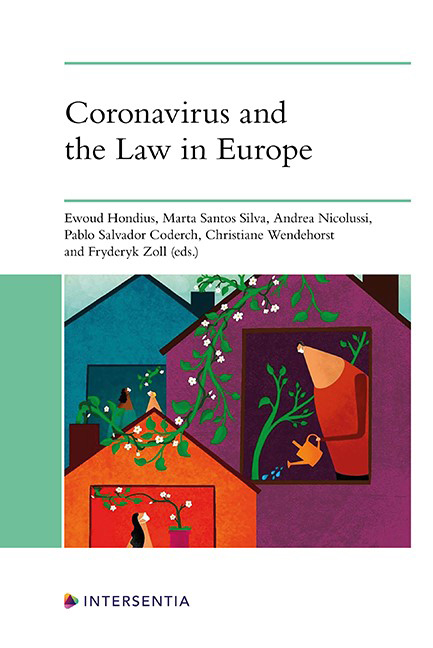Book contents
- Frontmatter
- Preface
- Contents
- List of Keywords
- List of Contributors
- PART I COVID-19 AND FUNDAMENTAL RIGHTS
- PART II STATES AGAINST THE PANDEMIC
- PART III COMPENSATION FOR COVID-19 RELATED DAMAGE
- PART IV CONTRACT LAW
- PART V CONSUMER LAW
- PART VI LABOUR AND SOCIAL LAW
- PART VII CORONAVIRUS CHANGING EUROPE
- Epilogue
- Annex: ELI Principles for the COVID-19 Crisis
- About the Editors
Epilogue
Published online by Cambridge University Press: 10 December 2021
- Frontmatter
- Preface
- Contents
- List of Keywords
- List of Contributors
- PART I COVID-19 AND FUNDAMENTAL RIGHTS
- PART II STATES AGAINST THE PANDEMIC
- PART III COMPENSATION FOR COVID-19 RELATED DAMAGE
- PART IV CONTRACT LAW
- PART V CONSUMER LAW
- PART VI LABOUR AND SOCIAL LAW
- PART VII CORONAVIRUS CHANGING EUROPE
- Epilogue
- Annex: ELI Principles for the COVID-19 Crisis
- About the Editors
Summary
This volume purports to provide an overview of the national and international measures developed to fight the COVID-19 pandemic in Europe, and aims to serve as a “toolbox” for judges and practitioners. By the time the book goes to print, the coronavirus, we are afraid, has not finished its devastating work. Virus mutations were even threatening that worse is still to come. Vaccination, however, is hopefully showing a way out. Developments such as these make it difficult to predict what the future will bring. We have therefore refrained from presenting the reader with a fully-fledged conclusion. Instead, we intend to offer you some ideas of a methodological nature, as well as some acknowledgements.
As regards the methodology: how did our project come into being? The historical background is to be found in the late 20th century, when several working groups of legal academics from various countries emerged. Commissions, such as Ole Lando’s Commission on European Contract Law, were created and working groups, such as those begun by Christian von Bar, Giuseppe Gandolfiand Reiner Schulze, among others, came up with drafts for a European Civil Code. By the early years of the current millennium, such projects began to run out of steam. The work was done, the money was spent. This did not mean that the members of the various groups lost touch. On occasions such as New Year, or disasters – as perceived by many – such as Brexit, contacts were again taken up, instigated by academics such as Hugh Beale and Matthias Storme. Likewise, early in 2020, when the pandemic started spreading, the group of former Commission members, now at around 100 members, proposed the idea of turning the negative development of the pandemic into something positive. The idea of a special volume was born. Over the past few months, this project has come to fruition. We will now present the way in which we have approached our task.
One of the first questions posed was: what purpose should the volume have? Two options were raised. The majority of the potential authors considered a classical overview of the law the best option.
- Type
- Chapter
- Information
- Coronavirus and the Law in Europe , pp. 1137 - 1140Publisher: IntersentiaPrint publication year: 2021

